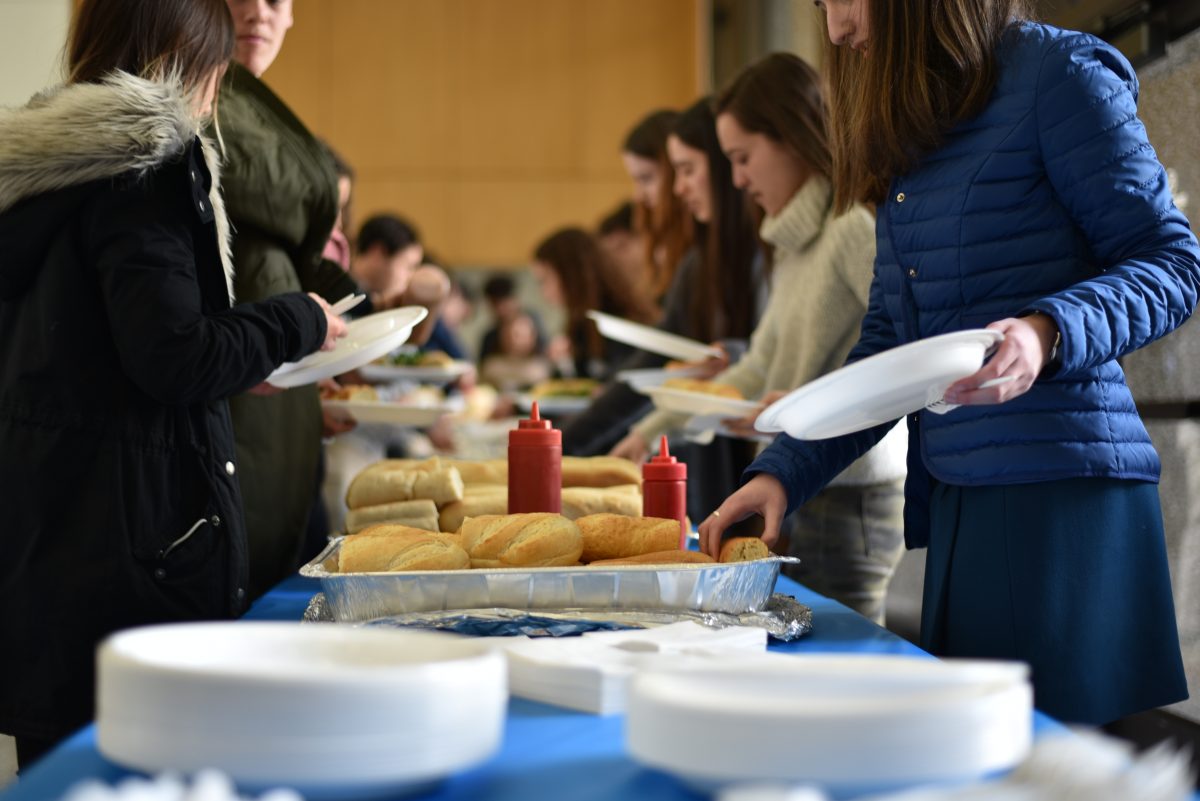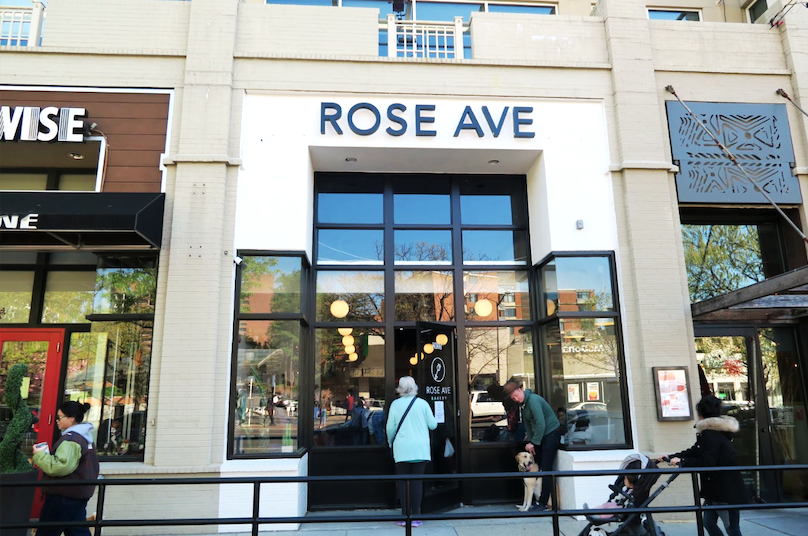As soon as I looked at the Rock Creek Food Company menu I was excited to meet Slavko Totev, the caterer for this year’s GIN Conference. From apricot chicken sausage sandwiches served with his Grandma Tzutzi’s tomato sauce, which is roasted for ten hours, to a seasonal salad with quinoa, buckwheat and seasonal vegetables, it was not the sort of food I’d expected for a high school conference or from a food truck.
The more research I did, the more impressed I was. In the food truck industry, specializing in handmade sausages is difficult due to obvious time and space constraints while serving customers, so selling the sausages is a feat in itself.

On top of that, the Washington Post describes the Hellasausage, the pork sausage option, as “one of the best bites on the streets of Washington”, and the chicken sausage as “a small chamber piece all its own, a sausage th
at accents its earthier elements with high notes of dried apple and ginger.” Doing somet
hing difficult and doing it well is Rock Creek Food Company’s forte. And as I interviewed Totev on his culinary background and beliefs, it was clear to see why.
He seemed a bit apprehensive at first, joking that he didn’t wear his suit today after being set up in front of a camera. But his passion for cuisine and for his job quickly surfaced as our conversation covered everything from the problems in the food truck industry to the importance of buying fresh, local produce, to his childhood on a farm in the Balkans. Here are some of the highlights:
Dateline: How did your childhood influence your cooking?
Slavko Totev: My grandmother and grandfather were from the mountain, rural area, and they were actually shepards when they were younger. They had like 3 to 400 sheep, and growing up I visited the farm quite often, and got to know farming and taking care of animals and, you know, just to understand where food comes from and how hard the work is to get this food to people’s table especially if you want it to be real.
I was born in the 80’s, communist time, and GMO wasn’t a word in the dictionary. You pretty much ate what you produced. Running around my grandma’s house, food was involved constantly, whether you were going to go and water it or to weed the garden.
… People have all sorts of tools these days, you know, food processors and dough makers. I saw my grandmother make phyllo dough with a dough bowl that was probably smaller than a baseball. She had this huge wooden, round thing, like, I don’t even know what it’s called. And she would roll it out so thin that you would be able to see through it, like it was insane!
… It influenced my food… just seeing how much love my grandmother put into her food. She would sit around and cook for hours! I was like, ‘What do you do for fun?’, and she was like, ‘You know, I go and milk the goats…’

How were you involved in the farming process?
There was a creek running underneath the house where you’d just go and by hand make like a little channel for the water to go to the garden, and then you’d have to separate it into like each and every row for tomatoes, onions, peppers, beans, you know, whatever it is. You would just get a piece of dirt, literally make a little wall for the water and you just wait until the soil is nice and moist. That was my job because I liked to play with dirt. Watering that garden took like three hours.
Is there a story behind Grandma Tzutzi’s ten-hour sauce?
Tzutzi is not actually her name, but Tzutzi is like some old big lady that went around in a cartoon or something and took the naughty kids away and put then in her house or something. She was like, taking care of all the naughty kids. My grandmother was on the larger side and she was a hardworking women. When I was a little kid, I was like, you look like Tzutzi! And everybody, I mean the entire village, my family, everybody, I mean people didn’t even know her name anymore. So that’s why it’s grandma Tzutzi’s ten hour sauce. Like I said, it’s simple peasant cooking, but that’s what I grew up with, and you cannot beat it. And only people within the less fortunate parts of the world know how to do that.

Why is growing and sourcing fresh produce important?
It will taste so much better when you eat it, I mean like, you guys are in school, so if you get an A, it’s the same thing with a tomato, I mean, you likes a C or a D or a F, I don’t. When I got an A, I was like, oh man, I worked so hard for it. It just gives you that feeling inside, you know, pride. You’re proud of what you’ve accomplished. It’s the same thing with growing food, I think.
Is there a problem with using local produce in the food truck industry?
People are too greedy and concentrated on the money making part. They also provide very low quality in food. They don’t want to spend the money that the local farms are asking for, for a nice product that is grown or raised locally and there will just go for the cheap stuff, frozen stuff.
Where you get tomatoes from? It’s freaking March. They don’t come until August, like July-August, the peak season. In Canada or Mexico, in greenhouses, you can pick tomatoes off the vine when they’re not completely ripe, and sugars are fully developed, and it’s not a nice, ripe, sweet tomato. I mean, you’ve probably eaten a tomato that’s local, and it just explodes in your mouth, and it’s so good, I mean, you don’t even need to do anything to it.

How does this “greed” influence small, local farmers?
I recommend to check out the documentary called Rotten, I believe it’s on Netflix. It’s seven or eight episodes, and it concentrates on the food war. There is a war out there that is between corporations and they are just fighting over who’s going to supply who. And we’re talking about a crazy amount of money, billions. …
The little guy has been crushed and smashed with their backs against the wall. We see how everyone is saying, organic, organic, farmer’s markets, etc, but the other day I saw a couple at the farmer’s market selling watermelons, peaches, stuff like that, I went to Costco one time, and guess what I saw? This couple, with carts full of this stuff. This is so unfair. You don’t even know what you’re buying anymore.
I’ve had people make fun of my concept, like they say: ‘Why do you work so much?’, ‘Why do you spend so much money on food from those Amish people, just because they look cool?’ I’m like, no, because they’re Amish people, they don’t believe in this modern-grown food, there’s no junk in it. They have like really nice mixed greens for like salad that I use, it’s not in season right now, but it’s pretty, so pretty, like some of the kinds that they use, I don’t even know what they are but they taste amazing. You know, one thing is peppery, another is sweet, one thing is like flowery. It’s like an explosion in your mouth. 
What are your goals for the future?
I think for me the goal is just constantly to get better. I think that many cooks, chefs if you like, but I don’t really think that chefs are a thing. I mean, chef is just like a thing to make you feel special. You’re a cook, man, this is it. You cook food. And even if you don’t cook it right now, you created it, so you must have cooked it at some point, and if you never cooked it, then why are you selling it?
Hearing Totev talk about his life on the farm, connected to his passion for local products, was inspiring. But, most importantly, his food got mainly positive reviews from the conference participants.

“The sausage is kind of spicy, which I really like, and its juicy and nice. And then gnocchi is like pasta… so….” one student said with a laugh. When asked to describe the pasta, the favorite dish by far, in one word, the answers ranged from “good” to “beautiful” to “obsessed.”
On the other hand, the salad seemed to be more of a flop. One interviewee candidly stated, “I didn’t really like it” while another said, tactically, “It tastes kind of… different.” Another critique was on the selection. One student said “I would have some more options, because it seems pretty limiting as to what people can eat. Like this is meat, and this one has cheese, and I know a lot of people are like vegans.”
Having the Rock Creek Food Company cater for the GIN Conference was definitely a smart move, both for a conference whose goal is to raise awareness on global issues, such as the food waste and its environmental impacts, and to feed a crowd of hungry high schoolers craving something delicious. In terms of authenticity, environmental awareness, and tastiness, the catering at GIN was a hit.


































































